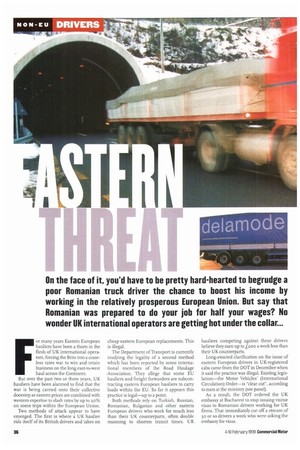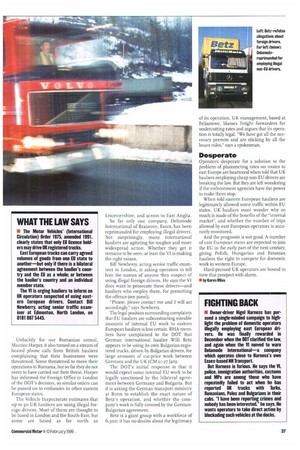On the face of it, you'd have to be pretty
Page 38

Page 39

If you've noticed an error in this article please click here to report it so we can fix it.
hard-hearted to begrudge a poor Romanian truck driver the chance to boost his income by working in the relatively prosperous European Union. But say that Romanian was prepared to do your job for half your wages? No wonder UK international operators are getting hot under the collar...
For many years Eastern European hauliers have been a thorn in the flesh of UK international operators, forcing the Brits into a ceaseless rates war to win and retain business on the long east-to-west haul across the Continent. But over the past two or three years, UK hauliers have been alarmed to find that the war is being carried onto their collective doorstep as eastern prices are combined with western expertise to slash rates by up to 2096 on some trips within the European Union.
Two methods of attack appear to have emerged. The first is where a UK haulier rids itself of its British drivers and takes on cheap eastern European replacements. This is illegal.
The Department of Transport is currently studying the legality of a second method which has been reported by some international members of the Road Haulage • Association. They allege that some EU hauliers and freight forwarders are subcontracting eastern European hauliers to carry loads within the EU. So far it appears this practice is legal—up to a point.
Both methods rely on Turkish, Russian, Romanian, Bulgarian and other eastern European drivers who work for much less than their UK counterparts, often double manning to shorten transit times. UK hauliers competing against these drivers believe they earn up to £200 a week less than their UK counterparts.
Long-awaited clarification on the issue of eastern European drivers in UK-registered cabs came from the DOT in December when it said the practice was illegal. Existing legislation—the Motor Vehicles' (International Circulation) Order—is "clear cut", according to men at the ministry (see panel).
As a result, the DOT ordered the UK embassy at Bucharest to stop issuing visitor visas to Romanian drivers working for UK firms. That immediately cut off a stream of 30 or so drivers a week who were asking the embassy for visas.
Unluckily for our Romanian consul, Maurice Harper, it also turned on a stream of heated phone calls from British hauliers complaining that their businesses were threatened. Some threatened to move their operations to Romania, but so far they do not seem to have carried out their threat. Harper has informed the Foreign Office in London of the DOT's decision, so similar orders can be passed on to embassies in other eastern European states.
The Vehicle Inspectorate estimates that up to 50 UK hauliers are using illegal foreign drivers. Most of them are thought to be based in London and the South-East, but some are based as far north as Leicestershire, and across to East Anglia.
So far only one company, Delamode International of Braintree, Essex, has been reprimanded for employing illegal drivers. Not surprisingly, many international hauliers are agitating for tougher and more widespread action. Whether they get it remains to be seen: at least the VI is making the right noises.
Bill Newberry, acting senior traffic examiner in London, is asking operators to tell him the names of anyone they suspect of using illegal foreign drivers. He says the VI does want to prosecute these drivers—and hauliers who employ them, for permitting the offence (see panel).
"Please, please contact me and I will act accordingly," says Newberry.
The legal position surrounding complaints that EU hauliers are subcontracting sizeable amounts of internal EU work to eastern European hauliers is less certain. RHA members have complained to the DOT that German international haulier Willi Betz appears to be using its own Bulgarian-registered trucks, driven by Bulgarian drivers, for large amounts of cut-price work between Germany and the UK (CM 21-27 Jan).
The DOT's initial response is that it would expect some internal EU work to be legally sanctioned by the bilateral agreement between Germany and Bulgaria. But it is asking the German transport ministry at Bonn to establish the exact nature of Betz's operation, and whether the company's work is fully covered by the GermanBulgarian agreement.
Bela is a giant group with a workforce of 6,500: it has no doubts about the legitimacy of its operation. UK management, based at Felixstowe, blames freight forwarders for undercutting rates and argues that its operation is totally legal. We have got all the necessary permits and are sticking by all the hours rules," says a spokesman.
Desperate
Operators desperate for a solution to the problem of plummeting rates on routes to east Europe are heartened when told that UK hauliers employing cheap non-EU drivers are breaking the law. But they are left wondering if the enforcement agencies have the power to make them stop.
When told eastern European hauliers are legitimately allowed some traffic within EU states, UK hauliers must wonder why so much is made of the benefits of the "internal market", and whether the number of trips allowed by east European operators is accurately monitored.
And the prognosis is not good. A number of east European states are expected to join the EU in the early part of the next century, giving Polish, Hungarian and Estonian hauliers the right to compete for domestic work in western Europe.
Hard-pressed UK operators are bound to view that prospect with alarm.
• by Karen Miles








































































































